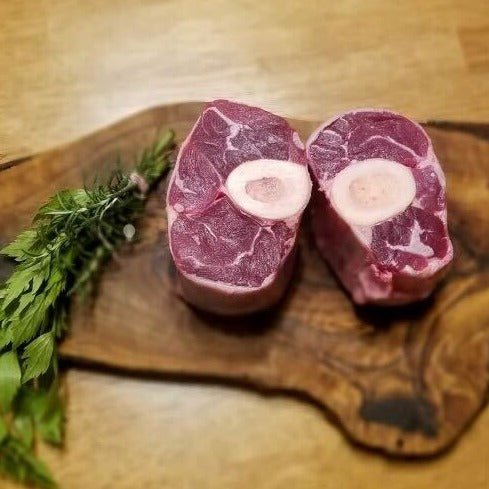
1/4 Grass-finished, Milk-fed Veal
1/4 Veal DEPOSIT Limited Supply!
*Farm Pick-Up Only!*
*Late Winter, Early 2025 Pick-up*
You may be wondering: why does a farm that focuses on individual animal care and compassionate husbandry sell veal?
This isn't veal anything like you've ever known. And there is literally no meat in the country as exceptional as this — and we don't have it often. Veal done right has a context, and we don't sell it outside of that context. The animal you are buying reached at least 500 pounds and grew almost as big as their mother, with whom he spent his whole life. He got to see her every day until his last. He ran with the cowherd and ate all the grass he wanted. He had an idyllic life.
Technically, veal is simply a young beef animal who was never weaned. What that means in the industry is often ugly, and these animals are never offered real milk, allowed off a chain or out of a crate or group pen, and they are denied hay because it would not allow the meat it’s characteristic white color, which just means anemic. Other things about their lives are not fit for dinner-table talk.
The origins of veal are simpler and humbler, and like most things related to farming, practical. In order for a dairy cow to produce milk, she has to have a calf, ideally every year to keep her in good lactation. Some of the heifers (females) are kept or sold to grow into milk cows, of course, but not all of them, and very few bulls are needed to keep up reproduction. So that leaves a lot of extra calves, who have been bred to be efficient milk producers but for whom being a beef animal isn’t in their genetic job description. After they are weaned, dairy calves are notoriously slow and inefficient to gain weight. Even if you got one for free, it would in many cases make more sense to buy a beef calf than try to raise a dairy calf for meat.
Calves are a byproduct of producing milk, so if we drink milk or eat cheese, we are complicit in how these animals are raised and cared for (or not). Enter veal. A dairy bull calf will never be fatter than when he’s drinking milk. The protein- and fat-rich milk is the perfect food for a growing calf, just as God designed it. They gain weight fast and if we harvest them at the end of the season, before we have to start feeding stored (expensive) feed, we can capture the best part of their growth curve and close the loop on the dairy reproduction cycle. The vast, vast majority of dairies sell their calves at auction, just to focus on making milk. The calves go to unspeakable places, and it doesn’t have to be so.
We are forging a path forward, providing an economically feasible way to produce a nutrient-rich food, while respecting the life of each animal, regardless of gender, born on the farm. This animal had a name, a distinct personality, a mother who loved him and lived a normal bovine life. We think that matters. Yes, that makes that inevitable day more difficult. But eating always involves sacrifice, and the only question is whether we are aware of it, and thankful for it. Gratitude begets gratitude. Wendell Berry says there are no unsacred places, only sacred places and desecrated places. I believe the same is true for animals. There are no unsacred animals, only sacred animals and desecrated animals. To me, they are all sacred.
We sometimes choose to make animals animals veal because they were horned and we elected not to disbud them as calves or to dehorn them as adolescents (the latter procedure is much more invasive), and yet we didn't really want them to mature into big boys with horns. So in this case, harvesting them as veal was the most humane option. You are the beneficiary of the most exquisite meat you've ever had.
Milk-fed, pasture-raised, dam-reared rose veal is truly a special meat. There are only a handful of producers in the country who raise animals like this, and the opportunity to buy this meat is a rare one, indeed.
What you will get: 1/4 of the cuts, ground, bones and liver from one animal
Osso buco
Ribeyes
Sirloins
Ground
Marrow and soup bones
Short ribs
T-Bones
Shoulder/chuck roast
Stew meat
Brisket
Fat (if extra after ground)
You will pay $11 per pound for the hanging weight (also known as the "hot carcass weight" on the rail), not by the finished product because you are buying a part of a whole animal. We expect the hanging weight will be between 60-70 pounds and your packaged weight of total product will probably be around 45-50 pounds. These are estimates! You are buying an animal in an old-fashioned way, and we are handling the processing for you. So we cannot guarantee any specific weights but you will get everything that can be cut off the carcass into a cut and all of the bones and liver from your quarter. The processor doesn't split the other organs into quarters, so only the liver is available. You do not pay less if you don't elect to get the liver or the bones, as you are buying part of a whole animal. Today's purchase is the deposit and you will get an emailed invoice with the balance before pickup. Pickup will be at our farm store, open Saturday from 11-3.
YOU MUST TYPE IN ORDER NOTES IN YOUR CART IF YOU WANT BONES, LIVER AND/OR FAT INCLUDED IN YOUR ORDER. IE: INCLUDE BONES, LIVER, AND FAT OR INCLUDE BONES AND FAT, NO LIVER, ETC. IF YOU DO NOT TELL US, IT WILL NOT BE INCLUDED AND DONATED BACK TO THE FARM.
*all deposits are non-refundable*

